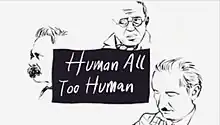Human, All Too Human (TV series)
Human, All Too Human is a three-part 1999 documentary television series co-produced by the BBC and RM Arts.[1] It follows the lives of three prominent European philosophers: Friedrich Nietzsche, Martin Heidegger and Jean-Paul Sartre.[1] The theme revolves heavily around the school of philosophical thought known as Existentialism, although the term had not been coined at the time of Nietzsche's writing and Heidegger declaimed the label.
| Human, All Too Human | |
|---|---|
 Opening titles | |
| Genre | Documentary |
| Directed by | Simon Chu, Jeff Morgan and Louise Wardle[1] |
| Voices of | Clive Merrison |
| Narrated by | Haydn Gwynne |
| Country of origin | United Kingdom |
| Original language | English |
| No. of series | 1 |
| No. of episodes | 3 |
| Production | |
| Executive producers | Simon Chu, Jeff Morgan and Louise Wardle |
| Producer | Celia Z. Bargh |
| Production locations | France, Germany, United Kingdom |
| Cinematography | Patrick Duval and Douglas Hartington |
| Editor | Michael Poole |
| Camera setup | Multi-camera |
| Running time | 50 minutes[1] |
| Production companies | BBC and RM Arts[1] |
| Release | |
| Original network | BBC 2 |
The documentary is named after the 1878 book written by Nietzsche, titled Human, All Too Human: A Book for Free Spirits (in German: Menschliches, Allzumenschliches: Ein Buch für freie Geister).[2]
Episodes
Each episode runs at 50 minutes,[3] for a total length of almost two hours and a half.[1]
- Episode 1: Beyond Good and Evil describes the life of Friedrich Nietzsche and his gradual shift from religion to nihilism, and finally, to insanity.[4] Towards the end of his life, his sister Elizabeth is depicted as a Nazi sympathizer who took advantage of his mental condition by falsifying his works and letters and attempted to portray him as proto-Fascist thinker.[5][6]
- Episode 2: Thinking the Unthinkable centers around Martin Heidegger, who developed ideas from the writings and ideas of Nietzsche in an attempt to better understand individual human freedom. Before and after the reign of the Nazis in Germany, Heidegger spent much of his time living in solitude in the hill of Todtnauberg to allow himself to clear his mind and better focus on his own philosophy. Due to the fact that he was a member of the Nazi Party from 1933 until the end of World War II, his works were dismissed by his critics as Nazi propaganda.
- Episode 3: The Road to Freedom describes the life of the French philosopher, Jean-Paul Sartre. This is when the term existentialism begins to enter the realm of philosophy. The documentary shows that Sartre believes it is up to each individual human being to give their own life a meaning and a purpose.
References
- "Human, All Too Human (8679)". EuroArts. Archived from the original on 2 July 2013. Retrieved 2 July 2013.
This lucid series tells the stories of Nietzsche, Heidegger and Sartre, three men who spent their lives in search of a philosophy that would make sense of this bewildering new world.
- Wicks, Robert (29 April 2011). Zalta, Edward N (ed.). "Friedrich Nietzsche". The Stanford Encyclopedia of Philosophy. Metaphysics Research Lab, Center for the Study of Language and Information, Stanford University. ISSN 1095-5054. Retrieved 2 July 2013.
Near the end of his university career, Nietzsche completed Human, All-Too-Human (1878) — a book that marks a turning point in his philosophical style and that, while reinforcing his friendship with Rée, also ends his friendship with the anti-Semitic Wagner, who comes under attack in a thinly-disguised characterization of 'the artist.'
- "Human, All Too Human: Nietzsche | Watch Documentary Online for Free". Documentary Storm. Retrieved 28 November 2022.
- "Human All Too Human, Part 1: Beyond Good and Evil - Friedrich Nietzsche". Streaming Media. University of Southampton. 1999.
The first of a three-part documentary series on philosophers whose work explored the nature of human freedom beginning with Friedrich Nietzsche
{{cite web}}: Missing or empty|url=(help) - Wroe, David (19 January 2010). "'Criminal' manipulation of Nietzsche by sister to make him look anti-Semitic". The Telegraph. London. Retrieved 2 July 2013.
Elizabeth Förster-Nietzsche, who went on to become a prominent supporter of Adolf Hitler, systematically falsified her brother's works and letters, according to the Nietzsche Encyclopedia.
- "Nietzsche's Sister and the Will to Power: A Biography of Elisabeth Förster-Nietzsche". International Nietzsche Studies. University of Illinois Press. July 2007. Retrieved 2 July 2013.
Carol Diethe contends that Förster-Nietzsche's own will to power and her desire to place herself —not her brother— at the center of cultural life in Germany are centrally responsible for Nietzsche's reputation as a belligerent and proto-Fascist thinker
This article is issued from Wikipedia. The text is licensed under Creative Commons - Attribution - Sharealike. Additional terms may apply for the media files.